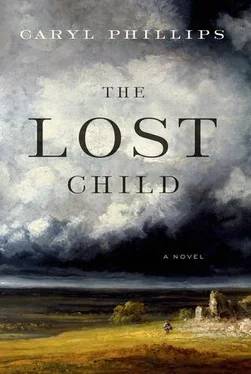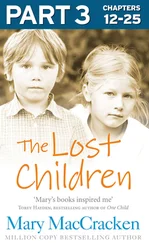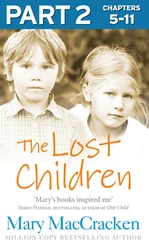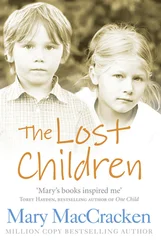What I do remember about London is that life was better outside the flat than in it. Our London street was quite wide, with tall houses on both sides and a café opposite us that we looked down on. There was a wall at the far end of the street, and if you got on your tiptoes and pulled yourself up, no doubt chafing the tips of your shoes as you did so, then behind the wall you could see slack water. I thought it was a river, or maybe a canal, but it was probably just the filthy runoff from some factory. However, as a child, I thought it looked splendid. After all, there was this mysterious body of water, and it was right at the end of my street. Of course, I’m pretty sure that I wasn’t allowed to go to the far end of the street by myself, so it must have been Mam who took me. I also remember going with her to a park that was under a bridge at the end of a main road. The park was little more than a steep, grassy hill that you walked up, and when you got to the top, you could look down and see right into a football ground. If it was a Saturday afternoon, then you could hear the noise and see the little spindly men running crazily around like clockwork toys, and I loved this and used to try and follow the match. Mam would smile and ruffle my hair. You’ve got lovely hair, Ben, but you’ll have to be careful that you don’t catch nits when you start up at school. If you do, they’ll shave it all off, and you’ll feel a right charlie. I looked up at Mam, who would usually be staring off into the distance, and then the sudden roar would tell me that somebody had scored a goal. You like your football, don’t you? And you know the names of all the players, don’t you? I’d nod confidently, but she’d just smile and say, give over with your fibbing.
On the way back to the flat she’d take it upon herself to remind me of the players’ names. Morrison, Chapman, Harvey, Connolley, Adamson, Connor, Firth, Young, Lewis, Appleton, and Smith. She’d laugh and then tickle me. Come on, you big soft lump, I know you can remember them, although come to think of it, I’ve no idea how she knew them. I suppose she must have memorized them from the papers, and she probably thought it was the sort of thing that boys ought to know. She’d make me practise the names till I got them right, and then she’d give me a gobstopper or an aniseed ball as a reward as we made our way back home. Come on, we’d better get a move on. Mam would reach down and take my hand, and with her other hand she’d push Tommy in the pram, and together we’d head off in the direction of the main road, where, during the week, the lollipop man patrolled the crossing when the children started to come out from school. This was the same school I was slated to attend come September. Once, when we were crossing the road right by the school, I noticed that one of my shoelaces had come undone, and so I stopped, and Mam bent down to tie it for me. Of course, in the end, I hardly spent any time at that school because we moved north to Leeds and left Dad behind.
I have a really clear picture in my head of the day a red double-decker bus got stuck under the bridge near the park, and how everyone came out and stood in the street and gloated. I don’t think anybody was hurt, but you’d have thought that the circus had come to town, for people were standing on the pavement and just gawping. I also have a good picture in my head of the rag-and-bone man trundling by our London flat with his horse and cart. Any old iron? I’d rush to the window and hop from foot to foot and beg Mam to take me downstairs and let me see the horse, and the few times that she did I could see that the horse looked even sadder and more clapped out than the rag-and-bone man. The man would slowly take his cart up the end of the street by the wall that held back the water and then do a clumsy U-turn and come rattling back with the same sad clip-clop sound. Any old iron? We never had anything to give him — nobody had — which makes me wonder why he bothered. At night Mam sometimes gave me an extra-big hug as she tucked me and Tommy into bed, and I liked that. I remember the train set, and the park and the slack water, and the rag-and-bone man, and the names of the footballers, and our Tommy in his pram, and the occasional extra-big hug. I also remember Dad. However, when we moved to Leeds, it was just me and Mam and Tommy and the telly, and George Formby behaving like a clot, and me and Mam used to laugh together on a Sunday afternoon while Tommy slept, and George Formby seemed to make her happy.
“My Boy Lollipop”—Millie Small
We soon got used to the fact that we didn’t have a dad, but it’s not like we saw that much of him when we lived in London. Me and Tommy used to go outside and kick our football on the grass that was beneath the balcony, before the council gravelled it over to make a play zone. When we finished, we’d go over to the side of the lifts where a rusty tap poked out of the wall, and we’d take it in turns to cup our hands and drink water until we couldn’t swallow anymore. One night we were asleep in our bedroom, and the next thing I knew I could feel Tommy shoving me, and when I opened my eyes, I could hear Mam crying, but I didn’t know what to do. I was the eldest, but I didn’t have any answers for this situation. Eventually I whispered to Tommy, let’s just go back to sleep. I was nearly seven and trying to be responsible. She’ll be alright, I said. Try not to fret. Things will be better in the morning. Tommy rolled over in his bed and closed his eyes, but I got my tiny transistor out from under the pillow and turned it on. I remember the song that was playing was “My Boy Lollipop,” but it’s a happy song and Mam wasn’t happy, so I quickly shut it off. I lay in bed with my eyes open, and I didn’t sleep that night as I was really worried about Mam.
“The Time Has Come”—Adam Faith
Every Sunday afternoon, me and Tommy used to sit cross-legged on the bright orange wall-to-wall carpet and watch the three o’clock film on the telly. Actually, first we’d watch the programme that showed the highlights of the best of Saturday’s football matches, and then we’d watch the three o’clock film. Mam would be lying on the settee resting. I’m tired, so you two please behave yourselves. After the film we’d go out and play football, as we had no interest in Songs of Praise , or any religious programmes. Because it was just the two of us, we’d play shots-in with jumpers for goalposts, and if the ball went anywhere near a jumper, we’d always claim it was a goal, arguing that if it had been a real goalpost, it would have gone “in-off.”
The film I remember the most was called What a Whopper , and it starred somebody I’d never heard of called Adam Faith. Mam slept through it, but me and Tommy both liked it, and I loved one of the songs even more than I liked the film. I was about nine, and I decided that I wanted the record, but this was going to be tricky as me and Tommy didn’t get pocket money or anything like that, and so nicking it was most likely going to be the only option. On Saturday mornings I played football for an Under-10 side that met up in the city centre. I’d become accustomed to getting off the bus a stop early and then making a detour through the open market. Not the covered market, for that was always just setting up, and it was like Aladdin’s cave in there with a game row, a fish row, a butcher’s row, and even a pets row, which was actually my favourite. If, for some reason, I wanted to explore the covered market, I’d do that on the way home, but the open market was always set up before the covered one, and so I fell into the habit of pottering around there, and soon made myself familiar with nearly every stall, particularly the record shop that sold 45s with the centre bits missing. Thinking back, I reckon they must have been rejects from a jukebox or something, but they seemed okay to me, and I learned to idly flick through a few racks, and then, when the bloke wasn’t looking, I’d slip one or two 45s inside my jacket and trap them against my side by tucking in my elbow, but not so that it looked like I’d broken my arm or anything. I’d carry on looking for a while, and then casually lean down and pick up my kit bag and saunter off out of the market and in the direction of the team bus. I must have been quite good at this thieving because I never got caught. One morning I was looking through the records, and in amongst all the stuff by Blue Mink and Herman’s Hermits and The Small Faces, I saw “The Time Has Come” by Adam Faith, and I remembered it from the film.
Читать дальше












